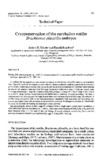Cryopreservation of the euryhaline rotifer Brachionus plicatilis embryos

រកមើល / បើក
Request this document
កាលបរិច្ឆេទ
1990Page views
129ទិន្នន័យមេតា
មើលកំណត់ត្រាលម្អិតនៃធាតុCited times in Scopus
Share
អរូបី
A method for the separation and cryopreservation of Brachionus plicatilis embryos is described. Juveniles with uniform development were collected from a cultured stock by passing them through a series of nets. Collected juveniles were cultured and the embryos separated by vigorous vortex mixing as soon as the majority had laid their first eggs. Separated embryos at stage I (cleavage stage), stage II (invagination stage), stage III (symmetrical embryo stage), or stage IV (“eyed” stage) were frozen to −196°C using various concentrations of DMSO and a two-step freezing procedure. No stage I embryos survived freezing and the highest post-thaw survival was obtained with stage III embryos. A DMSO concentration of 10% of the freezing medium resulted in high post-thaw survival while concentrations higher than 10% appeared to be harmful to embryos. Prolonged incubation in 10% DMSO for up to 30 min before freezing increased post-thaw survival.
Incorporating the above results, stage III embryos from a single batch culture were incubated in 10% DMSO for 30 min and frozen to −196°C. Post-thaw survival rates of 63%, 62%, 53%, and 55% were obtained after 3, 7, 15, and 30 days of storage in liquid nitrogen, respectively. Survivors fed actively on marine chlorella and started to lay eggs 2–3 days after thawing.
Suggested Citation
Toledo, J. D., & Kurokura, H. (1990). Cryopreservation of the euryhaline rotifer Brachionus plicatilis embryos. Aquaculture , 91(3-4), 385-394. https://doi.org/10.1016/0044-8486(90)90202-X
ប្រធានបទ
បណ្តុំបណ្តុំ
- AQD Journal Articles [1221]

